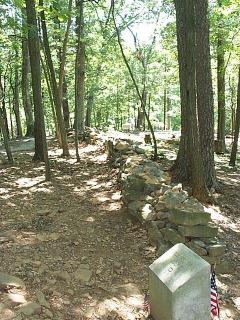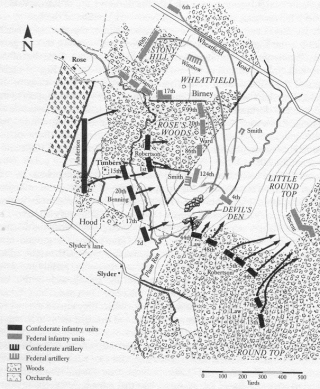
After the initial attack by the 47th Alabama was repulsed, Lieutentant Nichols reported to Chamberlain that "something queer" was going on in his front. Chamberlain mounted a large rock in the center his line "to resolve the queer impression", the 20th Maine was being flanked! Chamberlain called together his captains and told them his plan. They would thin the line out to one man deep and extend the line. Chamberlain then took the colors and placed them on the rock, where today their monument stands and turned his line 90 degrees from the original front, making this new line twice as long as his original one. The Rebels attacked again, this time the 15th Alabama, Chamberlain writes, "The edge of the conflict swayed to and fro, with wild whirlpools and eddies. At times I saw around me more of the enemy than of my own men; gaps opening, swallowing, closing again with sharp convulsive energy; squads of stalwart men who cut their way through us, disappearing as if translated."

The right end of the 20th Maine's line on Little Round Top

Five times the 15th Alabama charged them and the 20th Maine held. After the last Rebel charge, they were out of ammunition and could get no more. Chamberlain writes, "Desperate as the chances were, there was nothing else for it, but to take the offensive. I stepped to the colors. The men turned towards me. One word was enough. BAYONETS!! It caught like fire, and swept along the ranks." In a great wheel, starting with the part of the line that had been refused they started forward. At first the Rebels tried to make a stand but the "frenzied bayonets pressed through every space." Confederate Colonel Oats remembered his men's retreat, "We ran like a herd of wild cattle."
Chamberlain encountered a Rebel colonel while racing through the trees. The colonel fired his Navy Colt at Chamberlain's face at nearly point blank range and somehow missed. Chamberlain placed the point of his sword at the colonel's throat and the colonel surrendered both his Colt and his sword. "I gave the sword to a brave sergeant at my side, but kept the pistol with its loaded barrels for myself, which I thought might come in handy soon, as indeed it did."
"It was no light task to get our men to stop. They were under the momentum of their deed. They thought they were on the road to Richmond. They had to be reasoned with, persuaded, but at last faced about and marched back to that vital point which it was our orders and our trust to hold."
|

